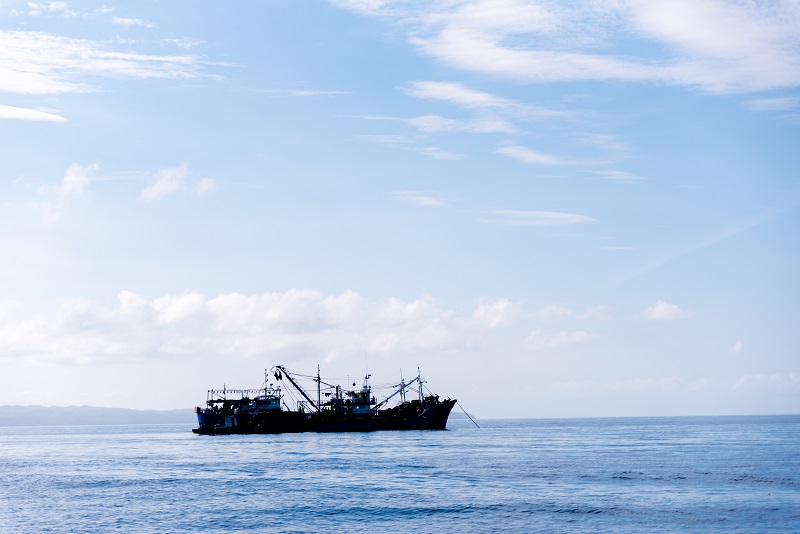
Ending forced labor in global supply chains requires greater coordination and collaboration among global trading partners.
By Elizabeth Fay, Senior Director of Policy Advocacy, Verité
Recently in Osaka-Saki, Japan, the G7 Trade Ministers convened to discuss key issues affecting the global trading system and the topic of fishing subsidies was high on the agenda. Each year, governments worldwide provide an estimated $35.4 billion to subsidize their fishing fleets and over 60% of these subsidies go to commercial fishing that contribute to depletion of the world’s fish stocks. The G7 Ministers pledged to work on additional provisions to the historic agreement struck last year by the World Trading Organization (WTO) to reform fishing subsidies. The call for action was to seek greater alignment with Sustainable Development Goal 14.6, which addresses overfishing and Illegal, unreported, and unregulated (IUU) fishing.
Greater linkage of fishing subsidies to Sustainable Development Goal 14.6 is an overdue step; however, the current definition of what constitutes illegal fishing does not include the use of forced labor. We know through Verité’s work on seafood and recent in-depth investigative reporting by The Outlaw Ocean Project, that the insidious use of forced labor is pervasive throughout the global fishing industry and must be addressed.
Separately at the G7 meeting, Ministers recommitted to taking measures to eradicate forced labor and child labor in global supply chains, however, these discussions did not intersect with talks on IUU fishing. G7 Members are encouraged to expand the scope of IUU fishing to include forced labor and align to Sustainable Development Goal 8.7, which aims to eradicate forced labor and modern slavery.
Putting a halt to the trade of goods produced through forced labor demands collective action among trading partners. A critical tool for this is an import trade ban on goods produced with forced labor. While nearly all G7 Members adopted forced labor import bans or are currently considering them, mere prohibition isn’t enough. Coordination and collaboration are needed globally to ensure that trading partners with weak enforcement or lower labor standards do not become safe havens for goods produced with forced labor.
For example, earlier this year, Canada, Mexico, and the United States met to discuss the implementation of the Forced Labor Import Ban negotiated in the USMCA Trade Agreement. They identified a critical need for cross-border cooperation, technical assistance, and knowledge-sharing to ensure a North American trading region that stops the flow of goods produced with forced labor. These efforts should be amplified and replicated. G7 Members and their trading partners must provide the needed support and funding to their relevant customs enforcement agencies to ensure that goods produced through the exploitation of workers do not cross their borders. Verité has joined the Coalition against Forced Labour in Trade to advocate for this critical need.
As we lend our voice to this crucial cause, Verité is committed to driving change in supply chains by providing businesses and other stakeholders with essential knowledge and publicly shared resources, such as the Responsible Sourcing Tool and the Supply Chain Traceability Matrix. Collaboration from all stakeholders is essential. We must all work together; forced labor has no place in the goods we produce and consume.
About the Author
Elizabeth Fay, Verite’s Senior Director of Policy Advocacy, leads the organization’s policy advocacy efforts to ensure accountability of labor rights within supply chains.
Sources:
International Labour Organization (ILO), Walk Free, and International Organization for Migration (IOM), Geneva, “Global Estimates of Modern Slavery: Forced Labour and Forced Marriage”, 2022, www.ilo.org/wcmsp5/groups/public/—ed_norm/—ipec/documents/publication/wcms_854733.pdf
Sumaila, U. Rashid, et al. “Updated Estimates and Analysis of Global Fisheries Subsidies.” Marine Policy, vol. 109, Nov. 2019, p. 103695. https://doi.org/10.1016/j.marpol.2019.103695.
World Trade Organization, “Agreement on Fisheries Subsidies”, www.wto.org/english/tratop_e/rulesneg_e/fish_e/fish_e.htm, Accessed 23 November 2023.
Ministry of Foreign Affairs of Japan, “G7 Trade Ministers’ Statement”
https://www.mofa.go.jp/files/100573173.pdf , accessed 1 November 2023.
“United States, Mexico, and Canada Hold the Second Meeting of the Labor Council Under the United States-Mexico-Canada Agreement.” United States Trade Representative, ustr.gov/about-us/policy-offices/press-office/press-releases/2023/june/united-states-mexico-and-canada-hold-second-meeting-labor-council-under-united-states-mexico-canada.
Photo credit: Hijodeponggol, Shutterstock.